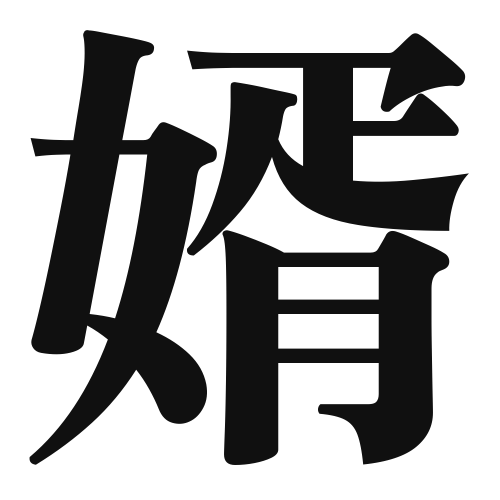1. Overview of Meaning
The kanji “婿” (muko) means “son-in-law” in Japanese. It refers to a man who marries into a family, particularly the family of his wife.
2. Formation and Radical
Formation of the Kanji: The kanji “婿” is a phonetic compound (形声文字) that combines the radical for “woman” (女) and a phonetic component that suggests the sound “muko.” This reflects the association of the term with marriage and family.
Radical: The radical of “婿” is 女 (woman), indicating its connection to gender and familial relationships.
3. Examples of Usage
Common Words and Phrases:
- 婿養子 (mukoyoushi) – adopted son-in-law
- 婿入り (mukoiru) – to marry into a family
Example Sentences in Daily Conversation:
- 彼は私の婿です。 (Kare wa watashi no muko desu.) – He is my son-in-law.
- 婿入りの儀式は伝統的です。 (Mukoiri no gishiki wa dentouteki desu.) – The ceremony for marrying into the family is traditional.
4. Synonyms and Antonyms
Similar Kanji:
- 夫 (otto) – husband; refers to a man in relation to his wife, but does not imply the familial connection of “婿.”
- 義理の息子 (giri no musuko) – son-in-law; a more formal term that emphasizes the legal relationship.
Antonyms:
- 嫁 (yome) – daughter-in-law; refers to a woman who marries into a family.
5. Cultural and Historical Background
Connection to Japanese Culture: In Japan, the concept of “婿” is significant in traditional family structures, where the son-in-law often plays a role in the family lineage and household responsibilities.
Proverbs and Idioms:
- 婿は家を継ぐ (Muko wa ie o tsugu) – A son-in-law inherits the family; this reflects the importance of family continuity.
